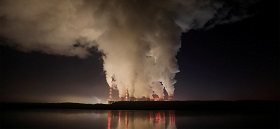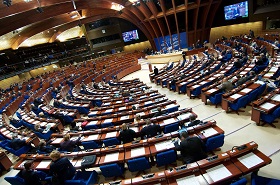When analyzing last month’s European Parliament elections, most observers primarily focus on the impressive results of the right-wing populists and Eurosceptics. Naturally, the advance of the right-wing parties is a major factor in the current political life of Europe. However, a factor that is of no lesser importance is the rather unexpected rise of Europe’s Greens, who were able to compete successfully with both right- and left-wing radicals and with the leading European centrist parties.
What does this mean for Moscow? The triumph of the Greens did not attract much enthusiasm from Russian politicians. And this is no coincidence. Traditionally, Russia has had difficult relations with European politicians of this particular persuasion. The political program of the Greens included environmental protection and combating climate change, emphasized human rights, called for increased attention to be paid to all kinds of minorities, and categorically rejected the notion of resolving international problems through the use of force.
Nonetheless, despite the inevitable difficulties in cooperating with Europe’s Greens, they may become a crucial strategic partner for Russia in the future.
Russia’s environmental agenda is still taking shape. Attempts to create a “Green Party” in the country have not been particularly successful so far. However, the Russian people are interested in the development of such an agenda, and this demand is likely to keep growing in the foreseeable future. Suffice it to mention the recent scandals surrounding landfills, and this is just the tip of the iceberg!
Clearly, Russia’s environmental agenda will not be recognized by the European Union if it takes the form of another simulacrum intended to handle ad hoc foreign political tasks. However, if Russia does succeed in transforming environmental protection into a priority of its national development, and if environmental thinking does make protecting nature a fundamental national value, it will certainly have a positive influence on the attitude to Russia around the globe in general, and in Europe in particular.
And then the Greens may prove to be Russia’s most reliable partners both in the European Parliament and in the legislative bodies of individual EU countries.
When analyzing last month’s European Parliament elections, most observers primarily focus on the impressive results of the right-wing populists and Eurosceptics. Naturally, the advance of the right-wing parties is a major factor in the current political life of Europe. However, a factor that is of no lesser importance is the rather unexpected rise of Europe’s Greens, who were able to compete successfully with both right- and left-wing radicals and with the leading European centrist parties.
The Greens finished second in the polls in Germany and third in France. They also achieved noticeable successes in Finland, Portugal, Irefland, and even the United Kingdom, which will soon be leaving the European Union. As a result, the Greens became the fourth largest faction in the European Parliament. Unlike the right-wing populists, they are a very close-knit and highly purposeful group. There is every reason to believe that their rise will not stop there: a third of Europeans under 30 voted for them in the elections.
What does this mean for Moscow? The triumph of the Greens did not attract much enthusiasm from Russian politicians. And this is no coincidence. Traditionally, Russia has had difficult relations with European politicians of this particular persuasion. The political program of the Greens included environmental protection and combating climate change, emphasized human rights, called for increased attention to be paid to all kinds of minorities, and categorically rejected the notion of resolving international problems through the use of force.
Naturally, Moscow is the only target of Europe’s environmentalists. For instance, in the spring of 2003, the leader of Germany’s Greens Party and the then Federal Minister of Foreign Affairs Joschka Fischer did not hesitate in closing ranks with his Russian and French counterparts to condemn the U.S. intervention in Iraq. However, during the conflict in Georgia in August 2008 and after the onset of the Ukrainian crisis in 2014, Europe’s Greens were among the Kremlin’s harshest critics.
Nonetheless, despite the inevitable difficulties in cooperating with Europe’s Greens, they may become a crucial strategic partner for Russia in the future.
Russia’s environmental agenda is still taking shape. Attempts to create a “Green Party” in the country have not been particularly successful so far. However, the Russian people are interested in the development of such an agenda, and this demand is likely to keep growing in the foreseeable future. Suffice it to mention the recent scandals surrounding landfills, and this is just the tip of the iceberg!
What is more, the environmental agenda is not divisive. Quite the contrary, it brings people together. It offers a chance to overcome the political barriers that Russian society is accustomed to, such as the barriers between the left and the right, between conservatives and liberals, between nationalists and globalists. Today, Russia needs a unifying agenda more than ever. We can even suppose that environmental protection will, at some point become one of those national ideas that Russia’s political philosophers have been searching for in vain for several decades.
Another unique feature of the environmental agenda is its comprehensive nature. It affects all aspects of public life in one way or another. The environment is tied to issues of economic and social modernization, local self-governance, civil society, freedom of the press, human rights, technological progress, culture, and healthcare. A serious approach to environmental protection inevitably sets the chain reaction of renewing society and the state into motion.
On the other hand, the specifics of international environmental cooperation mean that it practically does not fall under the scope of the European sanctions imposed against Russia. Most likely, this will not change. Even the most intractable European critics of the Kremlin will hardly object to cooperation in environmental issues, because the environmental agenda is transnational by definition, and any major environmental problem in Russia will inevitably and rapidly generate consequences west of Russia’s borders.
Finland’s presidency in the European Union in July–December 2019 opens additional tactical opportunities for Russia in environmental issues. Finland is one of Europe’s unquestionable “environmental leaders”: it has cutting-edge technologies and boasts the best examples of Europe’s “environmentally friendly” corporate culture. Moscow has extensive experience of successful bilateral and multilateral environmental cooperation with Helsinki. For instance, the environment of the North was the focus of Finland’s recent two-year presidency of the Arctic Council.
Clearly, Russia’s environmental agenda will not be recognized by the European Union if it takes the form of another simulacrum intended to handle ad hoc foreign political tasks. However, if Russia does succeed in transforming environmental protection into a priority of its national development, and if environmental thinking does make protecting nature a fundamental national value, it will certainly have a positive influence on the attitude to Russia around the globe in general, and in Europe in particular.
And then the Greens may prove to be Russia’s most reliable partners both in the European Parliament and in the legislative bodies of individual EU countries.







